As every year, Oxford University Press selects a word as the “Word of the Year,” for 2024, the chosen word is “Brain Rot.” Although the phrase was first used in 1854 by Henry David Thoreau in Walden, its relevance today is strikingly real.
In this blog article, we shall discuss about excessive screen time effects and what is brain rot and the mental drain. Also we shall find the symptoms and remedy to cure it like digital detox.
What is Brain Rot?
According to the Oxford English Dictionary, “Brain Rot“ refers to the deterioration of a person’s mental or intellectual health due to excessive use of online platforms, especially meaningless content. In simple terms, it means your brain is decaying.
“Brain Rot” highlights the growing dangers of excessive digital consumption.
Are You Experiencing Brain Rot?
Have you ever stayed up until 3 AM watching people lip sync to movie dialogues? Do you spend hours scrolling through reels of skating cats, people dancing to viral songs or exaggerated prank videos? Have you ever walked into a room and forgotten why you went there? Do you open the fridge and forget what you were looking for? Do you find yourself getting bored just 15 minutes into a movie or book? Do you struggle to follow conversations or feel exhausted despite doing nothing physically demanding?
If your answer to these questions is ‘yes,’ then beware! You might be suffering from Brain Rot.
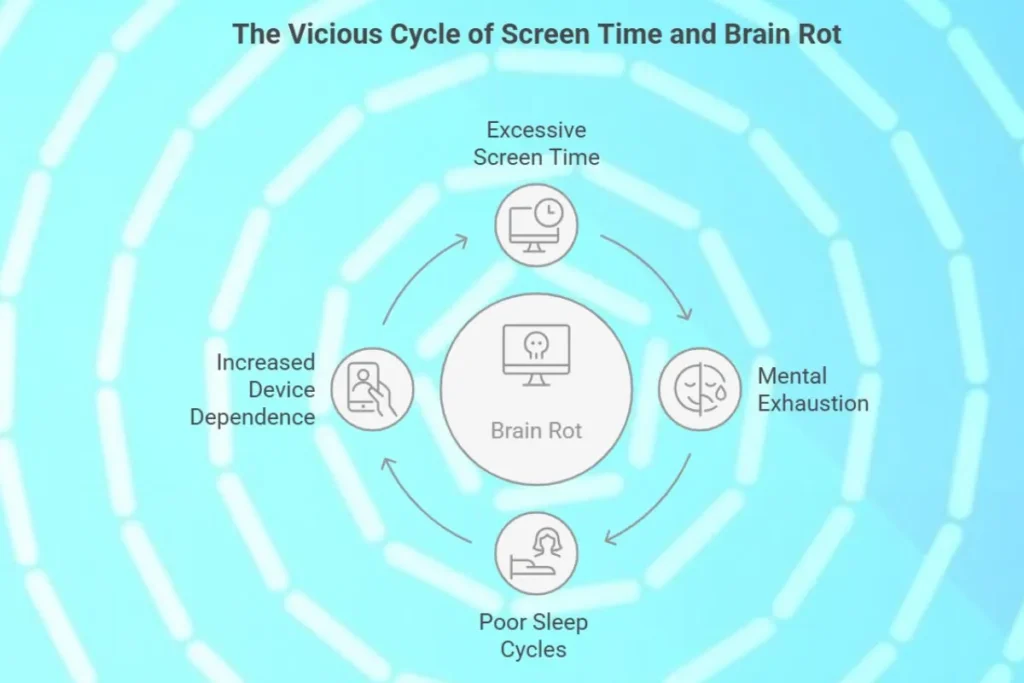
The Role of Excessive Screen Time
The primary cause of Brain Rot is excessive screen time. People across all age groups now spend hours glued to their mobile devices, consuming an endless stream of mindless content. Features like “endless scrolling” ensure that once you finish watching one reel, the next one automatically plays. Jumping from one app to another and continuously switching between different types of content overwhelms the brain. The result? Mental exhaustion.
Studies suggest that the human brain evolved to focus on important survival tasks. Early humans relied on sharp attention to detect potential threats, like a predator hiding behind bushes. Even today, while riding a bike, we subconsciously process multiple inputs like traffic signals, pedestrians and vehicles. However, the modern brain is bombarded with an overload of reels, memes, messages and posts, which makes it confused and drained.
In addition to affecting concentration, screen addiction also leads to poor sleep cycles. The blue light emitted by screens interferes with melatonin production, which reduces sleep quality. Lack of sleep then worsens brain fog, which makes people even more dependent on their devices for instant stimulation.
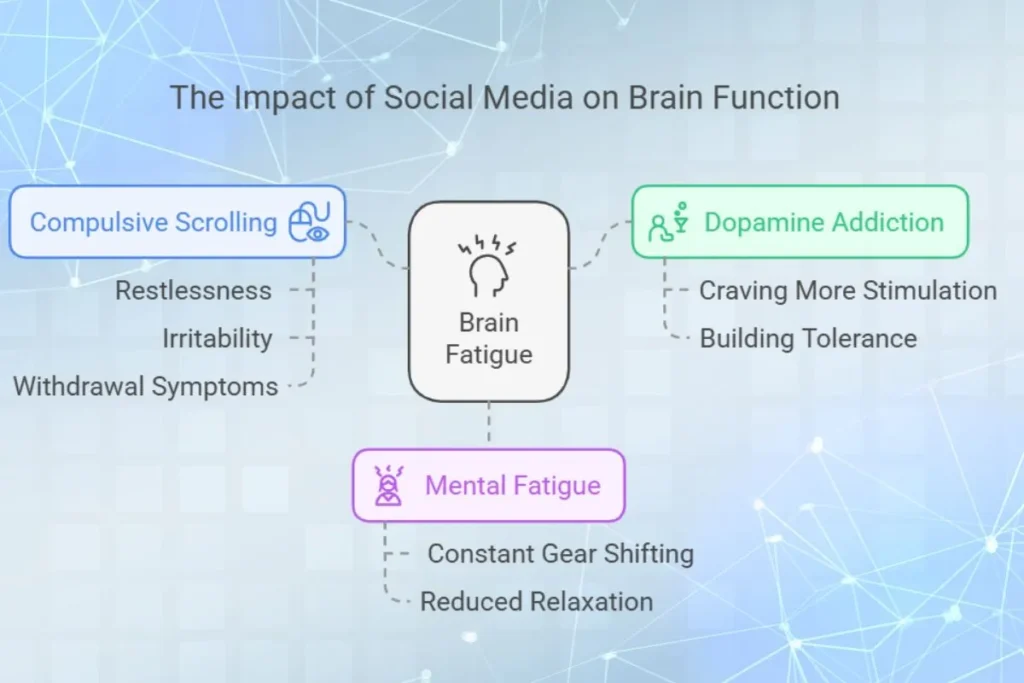
The Science Behind Brain Rot
Neurologists explain that many people assume that watching social media videos is a form of relaxation, but in reality, it is the opposite. Each reel presents a new topic like comedy, horror, drama, emotions etc., which forces the brain to constantly shift gears. This leads to mental fatigue instead of relaxation.
Furthermore, dopamine addiction plays a huge role. Dopamine is a neurotransmitter associated with pleasure and reward. Social media provides frequent dopamine “hits,” which makes users to crave for more. This leads to compulsive scrolling, where the quality of content does not matters but the next dopamine rush does.
Over time, the brain builds a tolerance to dopamine, requiring more extreme stimulation to achieve the same level of pleasure. This can lead to boredom, dissatisfaction and anxiety when engaging in real world activities that lack instant gratification. Many users report feeling restless, irritable or even experiencing withdrawal symptoms when attempting to reduce screen time.
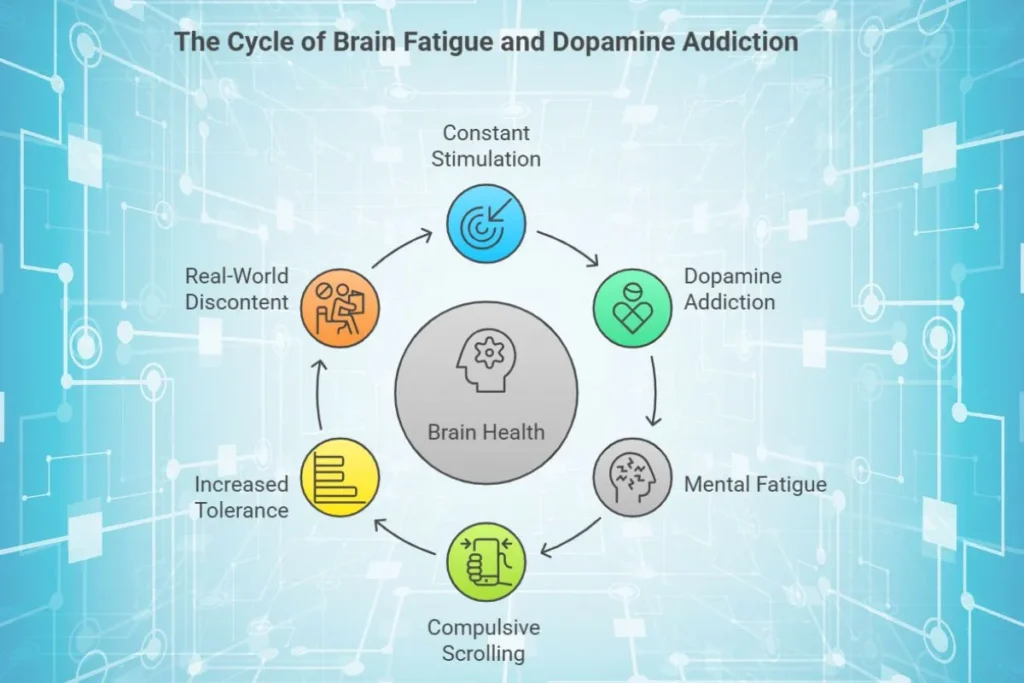
The Long Term Impact of Brain Rot
Although feeling drained after scrolling is a short term effect, the long-term consequences of Brain Rot are more severe:
- Reduced Attention Span: Microsoft’s study on 2,000 Canadians found that the average attention span has dropped to just 8 seconds – shorter than that of a goldfish! This decline impacts our ability to engage with long form content, which affects learning and deep thinking.
- Declining Memory and Decision Making: Studies from Macquarie University in 2024 indicate that excessive scrolling reduces gray matter in the brain, which affects memory, comprehension and problem solving abilities. Over time, this can lead to significant cognitive impairment.
- Mental Health Issues: A study published in Nature in November 2024 found that people with declining mental health are more likely to consume junk content, worsening their condition. This creates a negative feedback loop – poor mental health leads to more screen time, which further deteriorates mental well being.
- Social and Emotional Disconnect: Excessive digital consumption isolates individuals from real world interactions. Online relationships often replace genuine human connections, leading to increased feelings of loneliness and depression.
- Lack of Creativity and Productivity: Constant passive consumption limits the brain’s ability to generate original ideas. Instead of creating, people spend most of their time consuming, leading to a stagnation of personal growth.
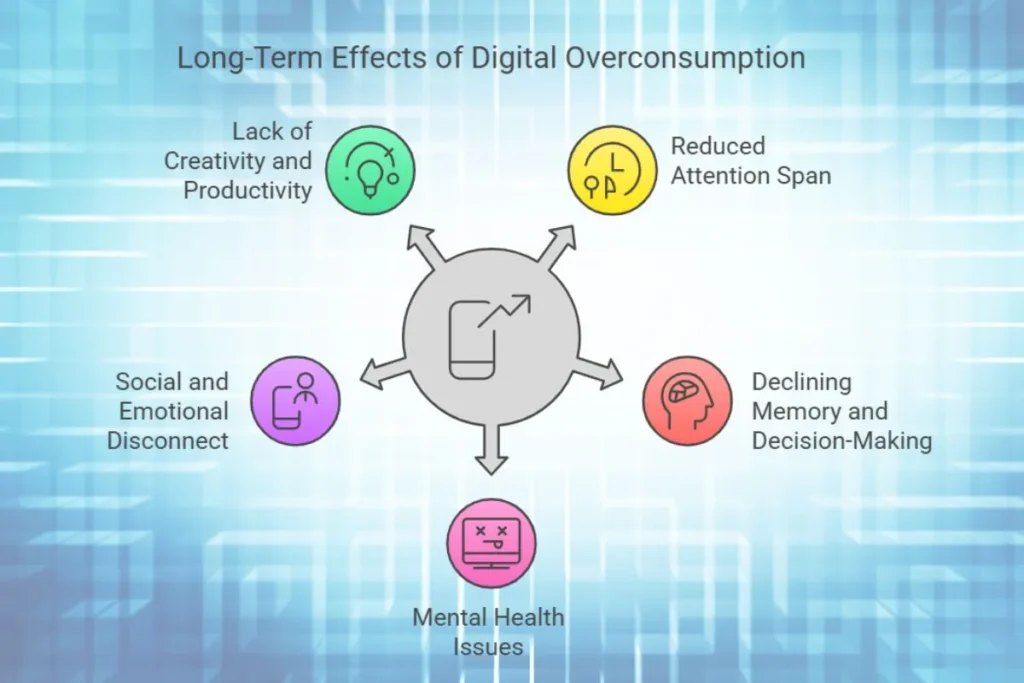
How to Break Free from Brain Rot
If you notice symptoms of Brain Rot, it’s time for a Digital Detox. Here are a few steps to regain control over your brain health:
- Reduce Screen Time – Set daily limits for apps and avoid mindless scrolling. Consider using features like “Focus Mode” or screen timers to manage digital consumption.
- Improve Content Quality – Prioritize meaningful and educational content over random entertainment. Follow channels or accounts that add value to your life instead of wasting time on junk content.
- Engage in Offline Activities – Read books, practice a hobby, exercise or spend time in nature. Activities like meditation and journaling can help reset the brain and reduce reliance on digital dopamine triggers.
- Control Dopamine Addiction – Instead of relying on social media for dopamine, seek rewards from creative and productive activities. Learning a new skill, playing a musical instrument, or engaging in deep conversations can provide natural dopamine boosts.
- Practice Mindful Consumption – Ask yourself, “Is this content valuable?” before watching anything. Create a “digital diet” and consume content intentionally rather than mindlessly.
- Improve Sleep Hygiene – Reduce screen exposure before bedtime to improve sleep quality. Try reading a book or listening to soothing music instead of scrolling through social media at night.
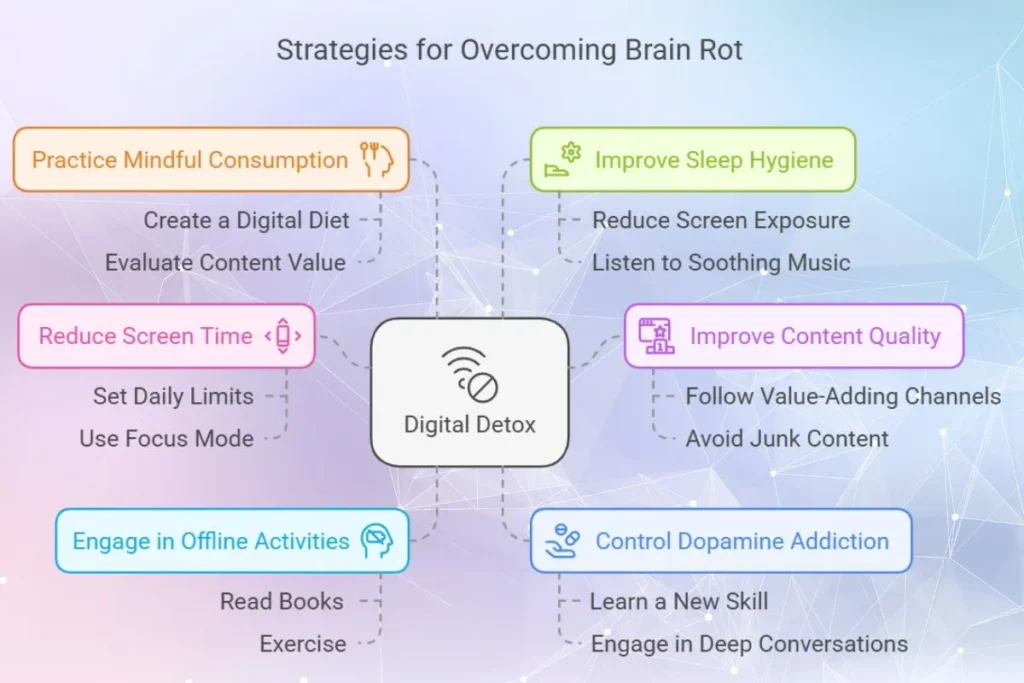
Conclusion
As historian Yuval Noah Harari states, the human brain is one of the most complex systems in the universe. It has the power to unlock atomic secrets and explore the cosmos. However, if we continue feeding it meaningless digital junk, we are going to waste its immense potential.
The good news? The same brain that falls victim to Brain Rot can also find ways to heal itself. The key lies in conscious digital consumption and balancing technology with real life interactions. The decision is in our hand: either we take charge of our digital habits or be prepared for the inevitable Brain Rot!
By making small but intentional changes, we can reclaim our focus, creativity and mental well being to ensure that our brains remain sharp, engaged and fully alive.

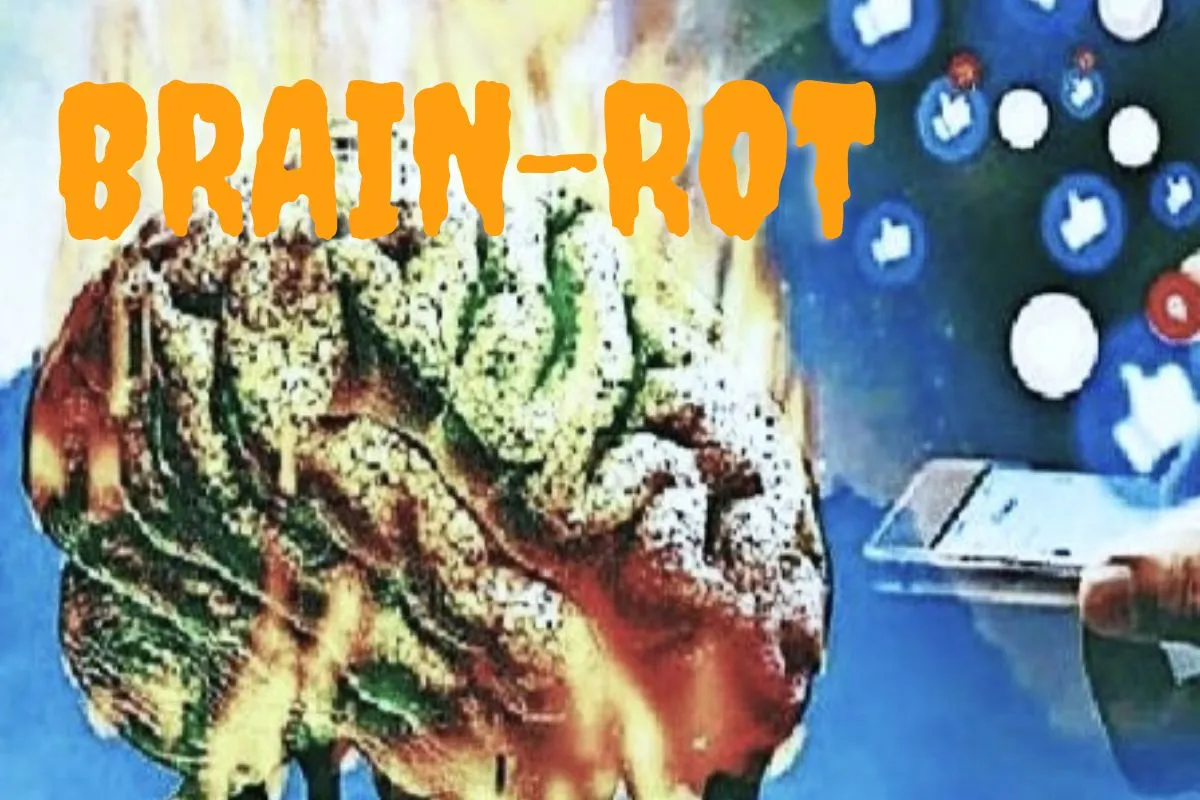
I simply could not go away your web site prior to suggesting that I really enjoyed the standard info a person supply on your guests Is going to be back incessantly to investigate crosscheck new posts
Fantastic site A lot of helpful info here Im sending it to some buddies ans additionally sharing in delicious And naturally thanks on your sweat
Your blog is a true hidden gem on the internet. Your thoughtful analysis and in-depth commentary set you apart from the crowd. Keep up the excellent work!
Your blog is a constant source of inspiration for me. Your passion for your subject matter shines through in every post, and it’s clear that you genuinely care about making a positive impact on your readers.
What i do not realize is in fact how you are no longer actually much more wellfavored than you might be right now Youre very intelligent You recognize thus considerably in relation to this topic made me in my view believe it from numerous numerous angles Its like men and women are not fascinated until it is one thing to do with Lady gaga Your own stuffs excellent All the time handle it up
Thank you for the auspicious writeup It in fact was a amusement account it Look advanced to far added agreeable from you However how can we communicate
Your writing is like a breath of fresh air in the often stale world of online content. Your unique perspective and engaging style set you apart from the crowd. Thank you for sharing your talents with us.
Hi i think that i saw you visited my web site thus i came to Return the favore I am attempting to find things to improve my web siteI suppose its ok to use some of your ideas
Excellent breakdown, I like it, nice article. I completely agree with the challenges you described. For our projects we started using Listandsell.us and experts for our service, Americas top classified growing site, well can i ask zou a question regarding zour article?
Excellent breakdown, I like it, nice article. I completely agree with the challenges you described. For our projects we started using Listandsell.us and experts for our service, Americas top classified growing site, well can i ask zou a question regarding zour article?
Simply wish to say your article is as amazing The clearness in your post is just nice and i could assume youre an expert on this subject Well with your permission let me to grab your feed to keep updated with forthcoming post Thanks a million and please carry on the gratifying work
Your blog is a breath of fresh air in the often stagnant world of online content. Your thoughtful analysis and insightful commentary never fail to leave a lasting impression. Thank you for sharing your wisdom with us.
Your article helped me a lot, is there any more related content? Thanks!